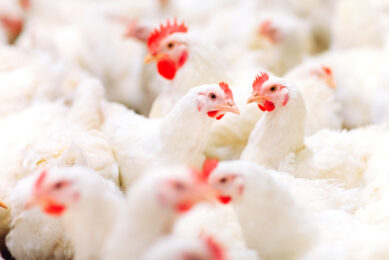Long term effects of acidified feed on a pig’s gut

Acidified feed helps reduce nitrogen emission in pig production but what are the long term effects on a pig’s bone mineralisation and mineral balance?
Researchers in Denmark investigated the long-term effects of feeding benzoic acid (BA) and calcium chloride (CaCl2) on the mineral balance and microbial activity in the gastrointestinal tract of pigs.
Four diets containing the combinations of 0 or 10 g/kg BA and 0 or 20 g/kg CaCl2 were fed to 24 pigs in a factorial design. For the diets without CaCl2, calcium carbonate (CaCO3) was added to provide equimolar levels of Ca. The pigs were fed the diets from 36 kg until slaughter at 113 kg BW, and they were housed in balance cages for 12 d from 60 to 66 kg BW. Supplementation of BA and/or CaCl2 had only minor effect on accumulation of digesta organic acids (acetate, propionate, butyrate and lactate) throughout the gastrointestinal tract. A reduction (P < 0.01) in digesta concentration was, however, observed for acetate and propionate in colon digesta for the CaCl2 supplemented diet. Moreover, CaCl2 supplementation reduced (P < 0.01) the gastric concentration of lactic acid. In the urine, pH was reduced by both BA (P = 0.04) and CaCl2 (P < 0.01). The diet with combined BA and CaCl2 resulted in the lowest retentions of both P (P = 0.03) and Ca (P < 0.01). Metacarpal III bones were lighter (P = 0.04) and shorter (P = 0.02) when replacing CaCO3 with CaCl2, but BA supplementation had no effect. Both replacing CaCO3 with CaCl2 and BA supplementation reduced the concentration in bone of P (P < 0.05), whereas the Ca concentration was not affected. Total mineral density in bones measured by CT-scanning was reduced (P < 0.01) in the medial and distal sections by BA and reduced (P < 0.01) in the proximal, medial, and distal sections by CaCl2.
In conclusion, the dietary supplementation of BA and the replacement of CaCO3 with CaCl2 affected the nutrient balances of P and Ca. Mineral concentration and total mineral density of metacarpal III bones was reduced both by BA supplementation and by replacing CaCO3 with CaCl2. The combined effect of BA and by replacing CaCO3 with CaCl2 may reduce bone strength during long-term feeding.











